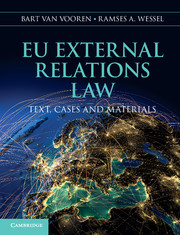Book contents
- Frontmatter
- Contents
- Table of cases
- Table of instruments and legislation
- Preface
- Acknowledgements
- List of abbreviations
- 1 The EU as a global legal actor
- 2 Instruments of EU external action
- 3 Existence of EU external competence
- 4 Nature of EU external competence
- 5 Scope and choice of EU external competence
- 6 The duty of cooperation
- 7 EU law and international law
- 8 The EU and international institutions
- 9 Common Commercial Policy
- 10 EU development policy
- 11 Common Foreign and Security Policy
- 12 Common Security and Defence Policy
- 13 The external dimension of the internal energy market
- 14 The external dimension of freedom, security and justice
- 15 The EU and its neighbours
- Index
- References
6 - The duty of cooperation
- Frontmatter
- Contents
- Table of cases
- Table of instruments and legislation
- Preface
- Acknowledgements
- List of abbreviations
- 1 The EU as a global legal actor
- 2 Instruments of EU external action
- 3 Existence of EU external competence
- 4 Nature of EU external competence
- 5 Scope and choice of EU external competence
- 6 The duty of cooperation
- 7 EU law and international law
- 8 The EU and international institutions
- 9 Common Commercial Policy
- 10 EU development policy
- 11 Common Foreign and Security Policy
- 12 Common Security and Defence Policy
- 13 The external dimension of the internal energy market
- 14 The external dimension of freedom, security and justice
- 15 The EU and its neighbours
- Index
- References
Summary
Central issues
As a consequence of the complex raft of rules pertaining to EU exclusive, shared pre-emptive, shared non-pre-emptive, parallel and retained Member State competences, there are many scenarios where the EU and the Member States will conduct external relations in a ‘mixed’ configuration.
This chapter revolves around Article 4(3) TEU, which contains the generally applicable duty of loyalty in EU law. Derived from that principle is the duty of cooperation, which is of paramount importance in the relationship between the EU and Member States in their external relations. It is a legal duty which applies across the scope of the EU Treaty, and which legally requires certain forms of behaviour of the EU and Member States in international contexts.
Tracing the evolution in CJEU case law, this chapter shows that the Court has judicially constructed a duty of cooperation which has evolved from merely requiring duties of best effort, to now requiring duties of result. In this chapter we conceptualize the duty of cooperation in the form of a policy timeline which is subdivided into two phases: the strategy and preparation phase; and the execution and implementation phase. This conceptual framework will explain that the duty of cooperation imposes different obligations of action or inaction on the EU and Member States, depending on which phase of the policy timeline they are currently in, and on the ‘intensity’ of collaboration and state of affairs within each phase.
- Type
- Chapter
- Information
- EU External Relations LawText, Cases and Materials, pp. 189 - 207Publisher: Cambridge University PressPrint publication year: 2014



